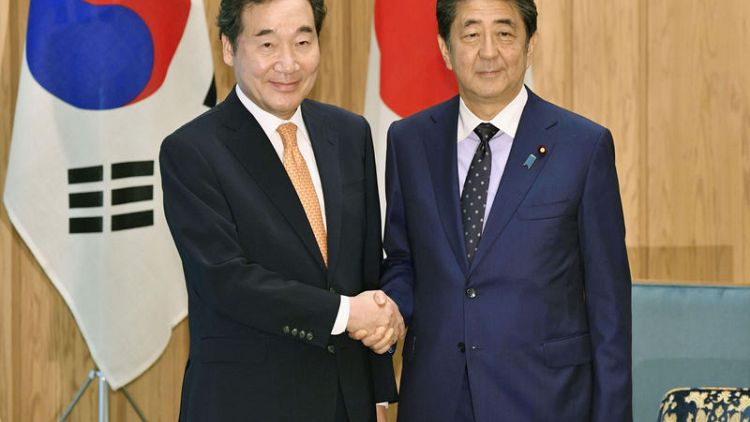By Kiyoshi Takenaka
TOKYO (Reuters) - Japanese Prime Minister Shinzo Abe and South Korean Prime Minister Lee Nak-yon agreed on Thursday on the need to cooperate on North Korea despite frigid bilateral ties, but Abe repeated that Seoul needed to keep its promises for relations to improve.
Ties between Tokyo and Seoul, two Asian allies of Washington, have deteriorated since South Korea's top court last October ordered some Japanese firms to compensate Koreans forced to work in their wartime mines and factories.
Japan, which says the matter was settled by a 1965 treaty, calls the decision a violation of international law, and the feud has spilled over into trade and security matters.
About 100 journalists were present at the start of the talks in Tokyo, the highest-level meeting between the two sides since the row flared. The meeting began with a handshake but no smiles.
Abe urged Seoul to keep its promises - a reference to the 1965 treaty - in order to restore relations, according to statement issued by Japan's foreign ministry.
"Our two nations are important neighbours for each other, and keeping in contact over North Korea, bilateral relations and our ties with the United States are quite important," Abe was quoted as telling Lee.
"Relations are currently in quite a severe state but should not be left that way. If South Korea can keep bilateral promises, that could be a chance to return to a healthy relationship," Abe added.
The statement also quoted Lee as saying he shared the view that dialogue was important, while a parallel statement from South Korea's foreign ministry said Lee agreed relations should not be left in their current difficult state.
In a sign that gaps remain wide, Lee told Abe that "South Korea has also respected and complied with the 1965 Treaty on Basic Relations and Claims, and will continue to do so," according to Seoul's statement.
Yonhap news agency said Lee, who was in Tokyo to attend Japanese Emperor Naruhito's enthronement ceremony this week, delivered to Abe a personal letter from South Korean President Moon Jae-in in which Moon called for attempts to resolve the pending bilateral issues.
Moon and Abe have not held a summit in more than a year and the statements made no mention of any meeting planned between the two.
The animosity between Japan and South Korea is linked to the history of Japan's 1910-45 colonisation of the Korean peninsula, the mobilisation of forced labour at companies and women in wartime military brothels, and a row over the ownership of islets in the sea between the two nations.
Earlier this year, the dispute escalated when Japan tightened export controls on materials vital for South Korean chipmakers. It then dropped Seoul from a list of countries eligible for fast-track exports, steps angrily denounced by South Korea.
In August, South Korea announced it would scrap a military intelligence-sharing pact with Japan when it expires next month, just as the allies face rising tensions over North Korea's nuclear weapons programme and increased competition from China and Russia.
(Reporting by Kiyoshi Takenaka in Tokyo and Joyce Lee in Seoul; writing by Linda Sieg and Elaine Lies; Editing by Lincoln Feast)
